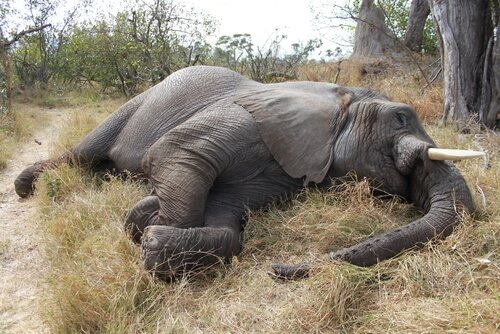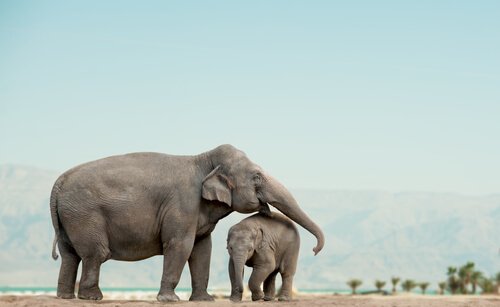The Massacre of 100 African Elephants in Botswana

The ivory war continues to threaten the wildlife in Africa. One of the worst incidences of poaching of African elephants has been confirmed: the death of 100 elephants in Botswana.
The massacre of 100 African elephants
This tragic discovery of nearly 100 dead elephants occurred during a helicopter flight by the NGO Elephants Without Borders in Botswana, where there is supposed to be the largest African elephant population in the world.
Protecting elephants from poaching is one of the main objectives of ecologist organizations in Africa. However, on this occasion, it looks like they have lost a battle in the ivory war. It’s estimated that a third of African elephant population has been killed in the last decade.
In regions like Tanzania, the figures are even more devastating. In the last five years, 60% of African elephants have disappeared, to the point where there are more elephants without tusks.

Botswana, the elephants’ last stronghold
People consider this country as the last great elephant sanctuary due to the fact that within its borders there is a population of 130,000 elephants, which is currently the largest in the world.
The attack of almost 100 elephants happened just a few kilometers from the Okavango Delta Wildlife Sanctuary, an area which attracts tourists from all over the world. Today, the world weeps for the tragic loss of dozens of elephants in part of the world.
According to members of the NGO, the poachers are using large-caliber bullets, which makes it more than clear that they’re serious. Probably the most tragic part of this massacre is that all the young elephants — which barely have any tusks — become orphans.
Elephants are highly social animals that based on matriarchs. The elephant matriarchy guides the herd and their loss can have a devasting chain reaction effect. Also, the nearly 100 elephants that have been killed are mainly older than 35 years old. Their bodies have remained rotting in the hot African sun with their tusks brutally torn out.

Hunting African elephants
According to people at the NGO Elephants Without Borders, the trend has been observed for a number of months. They are currently recording double the amount of poached animals than in any other part of Africa. Conservationists say this is because the government has disrupted the unity against poaching.
Ivory continues to be a very important business for poaching. In China, people are still using ivory to make many luxury products. As a result, ivory can reach prices of 846 euros per kilogram. The tusks of a large elephant can weigh up to 30 kilograms.
In order to understand how dangerous this declining number of African elephants really is, it’s important to remember that 30 years ago the total elephant population was over a million. This is why efforts to protect this species need to be doubled up in countries like Botswana.
The African elephant is one of the last examples of megafauna on the planet, which only live in the African savannah. Human beings have already done away with the large herbivores on most continents. However, although those that survive in Africa are still around, their very existence is under threat due to the greed of mankind.
All cited sources were thoroughly reviewed by our team to ensure their quality, reliability, currency, and validity. The bibliography of this article was considered reliable and of academic or scientific accuracy.
Said, M. Y., Chunge, R. N., Craig, G. C., Thouless, C. R., Barnes, R. F. W., & Dublin, H. T. (1995). African elephant database 1995. IUCN, Gland (Suiza). Species Survival Commission.
